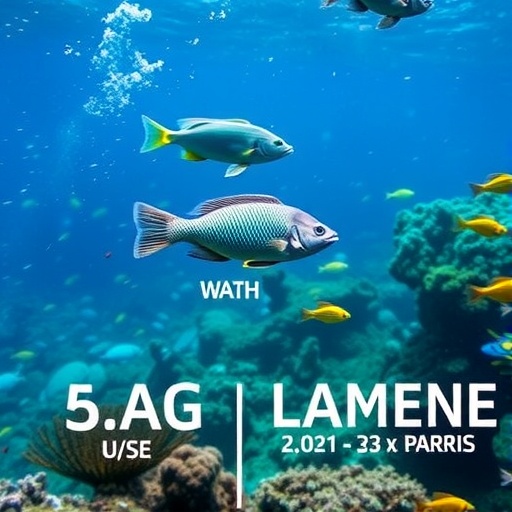In the aquatic ecosystems of coral reefs, turbulence plays a significant role in shaping the behavior and distribution of marine life. A recent study provides compelling insights into the effects of turbulence on zooplanktivorous fish, both free-swimming and those anchored to corals. This research is particularly relevant to understanding not only fish ecology but also broader ecological dynamics within coral reef habitats.
The study published in the prestigious journal Coral Reefs makes a noteworthy correction to previous assumptions around the behaviors of free and anchored zooplanktivorous fish when exposed to varying levels of water turbulence. Turbulence, often caused by wind, wave action, and currents, creates a dynamic environment in which zooplanktivorous fish must navigate to feed and avoid predation. These environmental factors significantly influence prey availability and predator pressure, thereby shaping the ecological narratives of coral reefs.
Many researchers have previously observed how aspects of turbulence can enhance nutrient mixing and mobilize plankton, potentially increasing food availability for marine fauna. Island ecosystems, including coral reefs, are particularly susceptible to changes in their tidal patterns and surface currents. The intricate relationships between such environmental factors and the survival strategies of local fish species merit careful investigation and ongoing research.
When addressing the reactions of anchored zooplanktivorous fish, the study provides quantitative assessments of how currents and turbulence interact with fish behavior. Anchored fish are often subject to the forces of water movement that can either help or hinder their feeding strategies. The correction presented in the paper acknowledges that anchored fish may experience a different type of turbulence profile compared to their free-swimming counterparts, which allows them to leverage their positions for feeding while minimizing energy expenditure.
Free-swimming fish, on the other hand, experience a different set of challenges and opportunities in turbulent environments. This study highlights how these fish often employ specific locomotion techniques to optimize their energy use while navigating through turbulent water. Species that can deftly maneuver through swirling currents not only improve their foraging efficiency but also enhance their survival rates in predator-rich environments.
The contribution of this research extends beyond immediate observations to encompass the implications of climate change on reef ecosystems. Increased storm frequency and intensity are predicted as climate change continues to alter ocean conditions. Understanding how turbulence affects fish behavior is critical for predicting how marine ecosystems might respond to these changes. As such, the findings of this paper underscore the importance of ongoing monitoring and conservation efforts in coral reef environments.
Within the broader context of reef health, the role of zooplanktivorous fish cannot be underestimated. These fish serve as a key link in the coral reef food web, supporting higher trophic levels, including larger predators. By examining how these fish react to physical stressors like turbulence, scientists can better understand the resilience of coral reefs to anthropogenic changes.
Moreover, waves and turbulence create microhabitats that can enhance the richness of the coral reef ecosystem. Variability in flow regimes can increase biodiversity, supporting various life stages of reef-associated species. The study thus highlights the synergy between physical oceanographic phenomena and ecological processes that are vital for sustaining healthy, resilient coral reefs.
In terms of methodology, the research team employed both field observations and experimental manipulation to gather data on fish behavior in relation to turbulent water environments. Their work involved tracking fish movements and feeding patterns, while also manipulating current conditions in controlled environments that mimicked natural settings. Such a multifaceted approach provides robust evidence to support their findings, enhancing the reliability of the conclusions drawn.
Importantly, academic discourse is a crucial component of advancing scientific knowledge. The correction indicated in the published paper serves as a reminder of the necessity for continuous scrutiny and peer-review in science. It encourages researchers to remain vigilant and open to revising existing paradigms that may no longer align with emerging evidence. This is not merely a technical correction; it encapsulates the essence of scientific inquiry — an evolving search for deeper understanding.
As we contemplate the future of coral reef ecosystems amidst looming threats, such research sheds light on potential management and conservation strategies that can be employed to bolster marine biodiversity. By fostering a nuanced understanding of hydrodynamic forces and their biological implications, conservationists can devise targeted interventions that could mitigate some of the adverse effects of climate change.
This investigation’s breadth and depth demonstrate a commendable commitment to elucidating the complex relationships within marine environments. The findings not only add a valuable dimension to the existing literature on zooplanktivorous fish but also chart a path for future inquiries into fish ecology in changing seas.
The implications of turbulence effects extend into various regulatory frameworks and marine protected areas management considering the dynamic and interconnected nature of ecosystems. Engaging policymakers and stakeholders with evidence-based strategies for conservation inspired by this research is undoubtedly a pathway toward sustainable marine stewardship.
In conclusion, the study spearheaded by Ishikawa and colleagues elucidates how turbulence affects fish behavior within coral reef ecosystems, reinforcing the essential interplay between marine biology and physical oceanography. By challenging preconceived notions and articulating the nuanced realities of fish life in turbulent waters, this research not only contributes to academic progress but also catalyzes critical conversations about the future of fragile coral reef ecosystems in a warming world.
Subject of Research: Effects of turbulence on zooplanktivorous fish behavior in coral reef ecosystems.
Article Title: Correction to: Turbulence effects on free and anchored zooplanktivorous fish in coral reefs.
Article References:
Ishikawa, K., Wu, H., Mitarai, S. et al. Correction to: Turbulence effects on free and anchored zooplanktivorous fish in coral reefs.
Coral Reefs 44, 1445 (2025). https://doi.org/10.1007/s00338-025-02693-y
Image Credits: AI Generated
DOI:
Keywords: Turbulence, zooplanktivorous fish, coral reefs, marine ecosystems, behavior, climate change.




